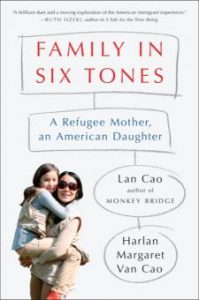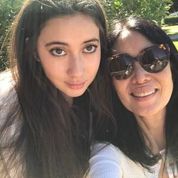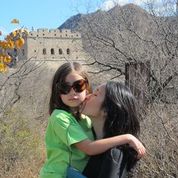Family in Six Tones: A Refugee Mother, an American Daughter
 Family in Six Tones: A Refugee Mother, an American Daughter is a multigenerational memoir co-written by acclaimed Vietnamese-American novelist, lawyer and professor Lan Cao and her daughter Harlan Margaret Van Cao.
Family in Six Tones: A Refugee Mother, an American Daughter is a multigenerational memoir co-written by acclaimed Vietnamese-American novelist, lawyer and professor Lan Cao and her daughter Harlan Margaret Van Cao.
After more than forty years in the United States, Lan still feels tentative about her place in her adoptive country, one which she came to as a thirteen-year-old refugee. And after eighteen years of being a mother, she still ventures through motherhood as if it is a foreign landscape. Lan explores these two defining experiences of her life with the help of her fierce, independently-minded daughter, Harlan.
In short chapters that both reflect and refract her mother’s narrative, Harlan describes the rites of passage of childhood and adolescence, as they are filtered through the after-effects of her family’s history of war and migration. Lan responds in turn, revealing her struggles to understand her American daughter.
In this unique format of alternating storytelling, their complicated mother-daughter relationship begins to crystallize.
Lan’s struggles with the traumatic aftermath of war, emotional flashbacks and dissociative identify disorder, become operatic and fantastical interludes as told by her daughter. Through explosive fights and painful setbacks, mother and daughter search for a way to accept the past and face the future together.
Family in Six Tones is at once special and universal, speaking to the unique struggles of refugees as well as the universal tug-of-war between mothers and daughters.
We asked Lan and Harlan what it was like to write a memoir together.
 My original ending to the memoir was pessimistic and broody, written as it was by an emotional, hormonal thirteen-year-old. My editors asked me to show that I was looking forward to my future and in essence, to acknowledge that the world was my oyster, not my jail. But I felt like the world was a shut clam, and I was stuck inside it with a mother whom I could neither live with nor without. I didn’t have the wherewithal to even fake optimism.
My original ending to the memoir was pessimistic and broody, written as it was by an emotional, hormonal thirteen-year-old. My editors asked me to show that I was looking forward to my future and in essence, to acknowledge that the world was my oyster, not my jail. But I felt like the world was a shut clam, and I was stuck inside it with a mother whom I could neither live with nor without. I didn’t have the wherewithal to even fake optimism.
The word wherewithal did make me laugh, though, as I used it to explain to my mother why I had reached my wit’s end. It had nothing to do with the editors themselves, or the lawyer who said some people had to be to disguised to make sure we would not be sued. It had everything to do with hating my life at the time. I understand how cliche that sounds, but it only appears spoiled and dramatic because I can be spoiled and dramatic.
The women in my extended family are quite befuddling, but I can identify a common pattern amongst them that makes it easier to understand my family and its history. They are part of a kaleidoscope of butterflies, migrating together; each butterfly is its own but the patterns are predictable.
The problem with this strategy is my mother. She does not fit into a predictable pattern. Often around seven in the morning as she drove me to school, we would go for each other’s throats. Something in her head told her that early morning was the time to confront me over whatever it was she felt I was doing wrong.
And when I fought back, she would scream through the rolled-down car window that I was the most impolite and ungrateful child she had ever met as I walked into school. It was not something I could talk to my friends about. I felt that if I brought up problems I was having with my mother caused by our writing the book, then I would appear braggadocious, and on top of it, no one could relate to anything I said.
 Sometimes, my mother would delete sections I had written about her that didn’t show her positively, or would simply replace adjectives I used with less extreme ones so she wouldn’t appear irrational. The act itself was irrational. And to her, when I complained about the stress, I was ungrateful to the publishing house for giving me any deal at all; I was ungrateful to her for stepping out of her comfort zone to write a memoir together.
Sometimes, my mother would delete sections I had written about her that didn’t show her positively, or would simply replace adjectives I used with less extreme ones so she wouldn’t appear irrational. The act itself was irrational. And to her, when I complained about the stress, I was ungrateful to the publishing house for giving me any deal at all; I was ungrateful to her for stepping out of her comfort zone to write a memoir together.
She would threaten to pull out of the memoir if I didn’t change something I had written and I in turn felt that no mother should say things like “without me you would have no deal and you would have nothing.” And then I would return to the car, kiss her on the cheek and walk into my first period class and when I returned home, we would fight again.
Lan
Our book is a mother-daughter memoir about war, migration, trauma. Turbulence itself. So it was probably natural that the process of writing the book was often turbulent. I had only written fiction, and the memoir form felt stark and raw. My daughter pushed me to venture into an abyss, and I was reluctant. I did want to quit. Although I did say “without me you would have no deal and you would have nothing,” I also said, “without you we would have no deal and there would be nothing.” That was the part she left out or perhaps didn’t hear, but it was true because the book’s originality was in the collaborative form, a duet of two voices. We needed each other for the book, as we need each other in our lives.
We both hope that readers will see that our relationship is true and raw and turbulent and loving, like all real relationships are; that our lives are intertwined through ups and downs and that often, no matter how one tries to shield one’s child from the world’s and our own troubles, they seep through because the child’s life, her skin and flesh, are not impermeable. That is okay. No one can be walled off and things have cracks in them because they are not an imagined perfection but are real. Despite our frequent tug of war, we did grow closer to each other while writing together. I also hope that Americans born in this country will see this book as a sort of love letter to America. My family left everything to come here. Not because it’s the most powerful country on earth but because of its promises.
ABOUT THE AUTHORS:
Lan Cao and Harlan Margaret Van Cao are the authors of Family in Six Tones: A Refugee Mother, an American Daughter.
Lan Cao is the author of Monkey Bridge and The Lotus and the Storm, and most recently of the scholarly work Culture in Law and Development: Nurturing Positive Change. She is a professor of law at the Chapman University Fowler School of Law, and an internationally recognized expert specializing in international business and trade, international law, and development. She has taught at Brooklyn Law School, Duke University School of Law, University of Michigan Law School, and William & Mary Law School.
Harlan Margaret Van Cao graduated from high school in June 2020 and is now attending UCLA. She was born in Williamsburg, Virginia and moved to Southern California when she was ten.
For more information, please visit https://lancaoauthor.com and follow the authors on Facebook, Instagram and Twitter.
Category: On Writing























